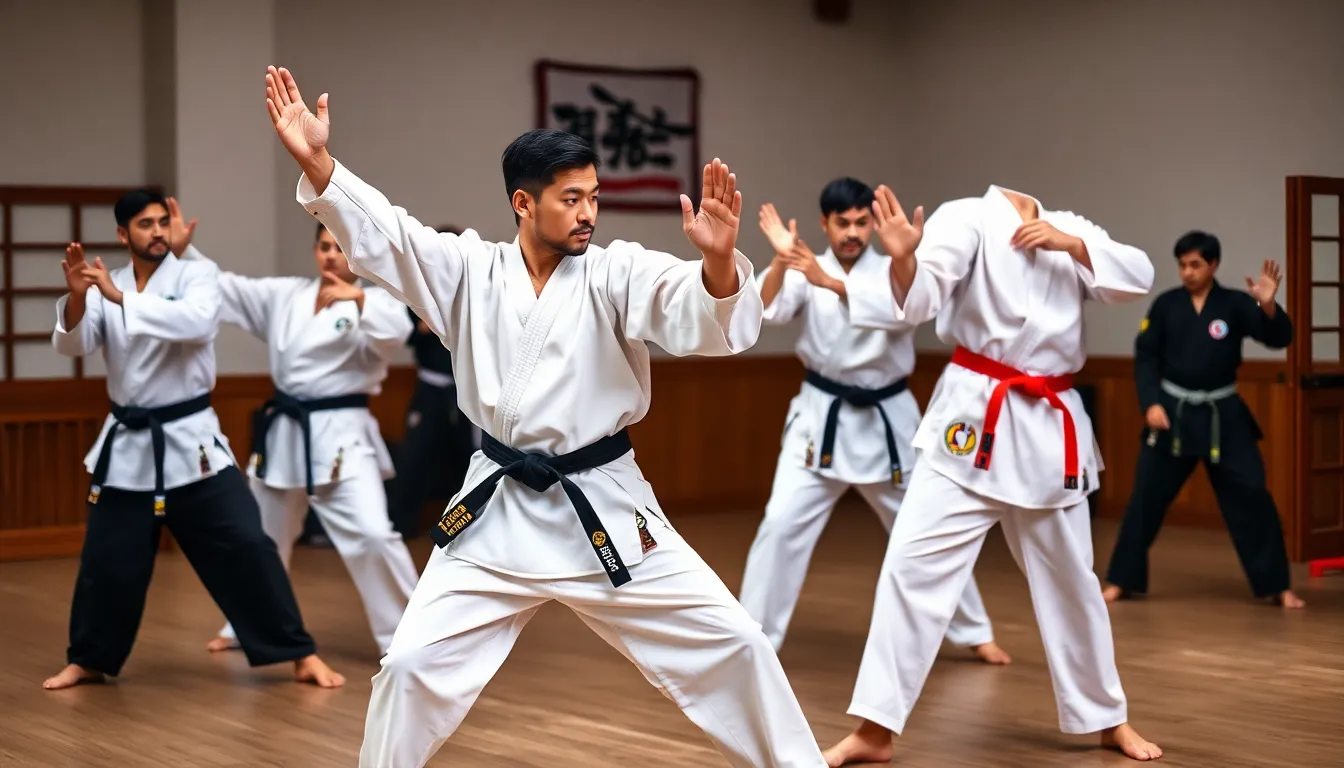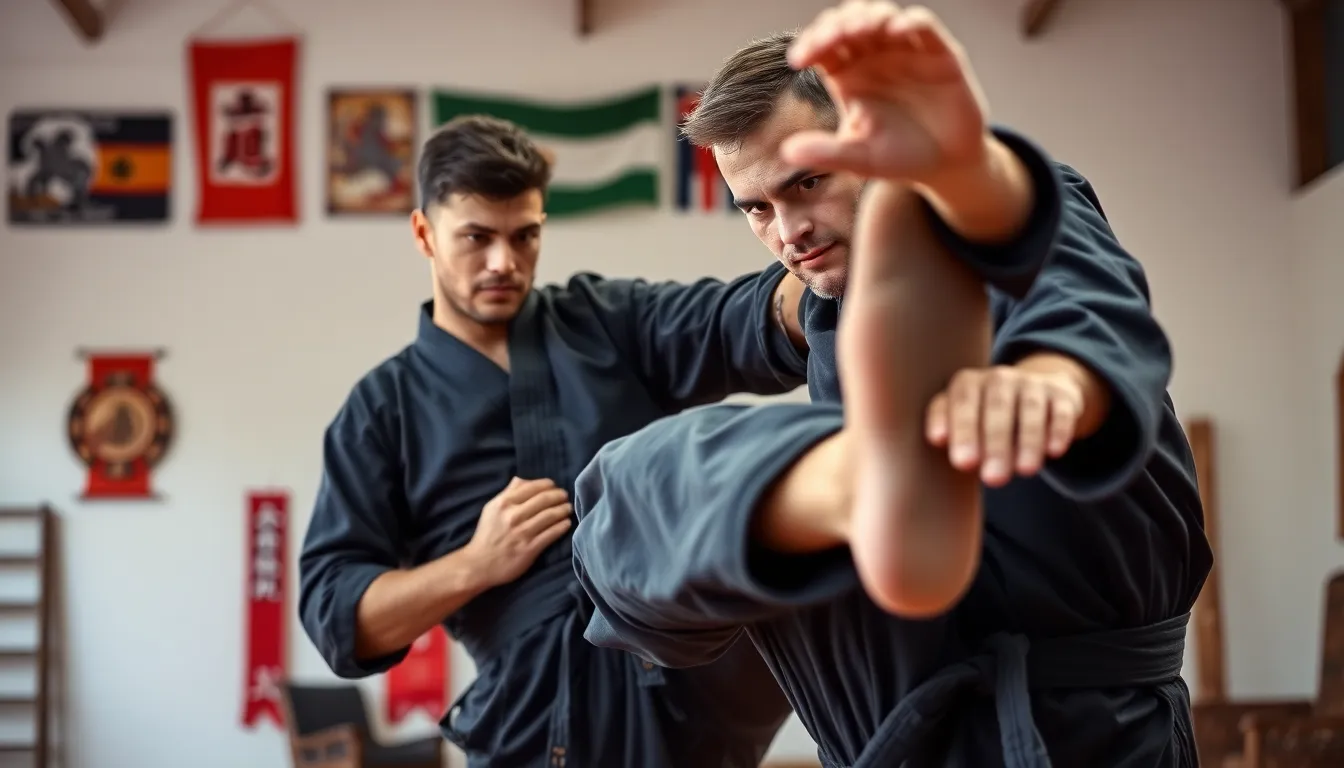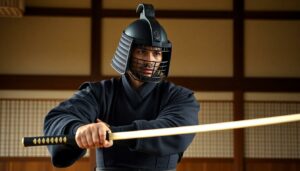Table of Contents
ToggleMartial arts certification is more than just a piece of paper; it’s a gateway to credibility and professional growth in the martial arts community. As practitioners strive to refine their skills and share their knowledge, obtaining certification becomes essential for those looking to teach or run their own schools. This process not only validates their expertise but also enhances their reputation among peers and students alike.
With various styles and organizations offering certification programs, navigating the options can be overwhelming. Understanding the benefits and requirements of each program is crucial for anyone serious about advancing their martial arts journey. Whether it’s for personal achievement or career aspirations, martial arts certification opens doors to new opportunities and fosters a deeper connection to the art itself.
Overview Of Martial Arts Certification
Martial arts certification serves as a formal recognition of a practitioner’s skills and knowledge. Certification varies across styles and organizations, each with its own standards and requirements. Many schools and governing bodies offer certification programs tailored to different levels of expertise, from beginners to advanced instructors.
Certification provides multiple benefits. It enhances credibility by validating a practitioner’s experience and abilities. Certified instructors often gain a competitive edge, attracting more students and opportunities for teaching. Certification also plays a critical role in professional development, offering access to advanced training, workshops, and resources for growth.
Prospective certifiers should consider several factors. They must evaluate the reputation of the certifying body, curriculum content, and costs associated with the program. Many programs may require practical examinations, teaching demonstrations, or documented hours of training.
Certification in martial arts promotes a culture of safety and professionalism. It ensures instructors possess the necessary skills to teach effectively and responsibly. Therefore, individuals interested in martial arts should explore certification options aligned with their career aspirations and personal growth objectives.
Types Of Martial Arts Certifications

Certification in martial arts varies widely, reflecting the diversity of styles and practices. Two main categories exist: traditional certifications and modern certifications, each with distinct characteristics and requirements.
Traditional Certifications
Traditional certifications stem from established martial arts styles such as Karate, Judo, Taekwondo, and Kung Fu. These programs often involve a rigorous progression through colored belts, each representing specific skill levels and knowledge. Typical elements include:
- Rank progression: Practitioners advance through a series of ranks based on tested competencies, including forms, techniques, and sparring.
- Cultural focus: Programs incorporate historical context, philosophy, and etiquette of the style, emphasizing respect for instructors and techniques.
- In-person examinations: Many traditional certifications require face-to-face assessments to evaluate both practical skills and theoretical understanding.
Organizations grant these certifications, often with a hierarchy of masters overseeing rank advancement. Examples include the Japan Karate Association for Karate and the World Taekwondo Federation for Taekwondo.
Modern Certifications
Modern certifications emphasize teaching methodologies and contemporary practices. These programs appeal to practitioners interested in instructor roles or fitness-oriented practices. Key features typically include:
- Instructor training: Certification programs focus on teaching techniques, class management, and student engagement strategies tailored for varying skill levels.
- Specialized programs: Many modern certifications cater to specific demographics, such as children’s martial arts or self-defense courses.
- Remote assessments: Some organizations utilize online platforms for training delivery and evaluations, offering flexibility in completing requirements.
Examples of modern certification organizations include the International Martial Arts Council and the American Martial Arts Alliance, which provide a range of instructional frameworks aimed at broadening the reach and accessibility of martial arts training.
Benefits Of Obtaining A Martial Arts Certification
Obtaining a martial arts certification offers numerous advantages that contribute to personal and professional growth.
Enhancing Credibility
Certification enhances an instructor’s credibility within the martial arts community. A recognized credential signifies proficiency, expertise, and dedication to the art. As students and parents evaluate instructors, verified certifications instill trust, leading to increased student enrollment. Organizations often endorse certified instructors, heightening their standing in the martial arts landscape. This credibility can differentiate instructors in a competitive market, affirming their commitment to high teaching standards.
Career Opportunities
Certification opens various career opportunities in martial arts. Certified instructors can teach at established schools, start their schools, conduct seminars, or provide online training. With the emergence of fitness-oriented programs, certified instructors can broaden their offerings, integrating martial arts into wellness and fitness regimes. Furthermore, certifications can lead to roles in coaching, program development, and consulting within organizations. This enhanced versatility allows individuals to build a sustainable career while contributing to the growth of martial arts as a discipline.
How To Choose The Right Certification Program
Choosing the right martial arts certification program requires careful consideration of various factors to ensure alignment with personal and professional goals.
Accreditation And Standards
Accreditation plays a crucial role in the legitimacy of a certification program. Accredited organizations meet specific standards set by industry leaders, ensuring quality and recognition. Prospective candidates should verify the following:
- Recognition: Confirm if the certifying body is recognized within the martial arts community.
- Standards: Assess the standards implemented by the organization, including safety protocols and instructor qualifications.
- Reputation: Research the reputation of the organization, looking for reviews and success stories from past participants.
Choosing an accredited program enhances credibility, facilitates career growth, and ensures that the training received aligns with industry best practices.
Course Content And Structure
The course content and structure determine the depth and relevance of the training. Candidates should evaluate these aspects:
- Curriculum: Examine the curriculum to ensure it covers essential topics relevant to teaching or practicing martial arts.
- Hands-On Training: Identify whether the program includes practical, hands-on training components that enhance skill application.
- Length and Format: Review the program’s length and format, ensuring it fits personal scheduling needs and learning preferences.
- Support Resources: Look for additional resources, such as mentorship, online access to learning materials, and opportunities for further training.
An effective program balances theory and practice, equipping instructors with the necessary tools to succeed in their careers.
Martial arts certification plays a crucial role in shaping a practitioner’s career and reputation. By obtaining certification, individuals not only validate their skills but also enhance their credibility within the martial arts community. This formal recognition opens doors to various teaching opportunities and professional growth.
As practitioners explore certification options, it’s essential to consider the program’s accreditation, curriculum, and support resources. Choosing the right path can lead to a fulfilling career that contributes to the growth and safety of the martial arts discipline. Embracing certification is a step toward excellence and responsible instruction, ensuring that future generations of martial artists receive quality training.




